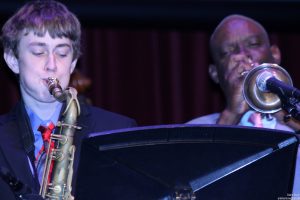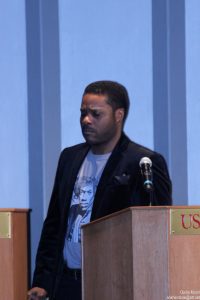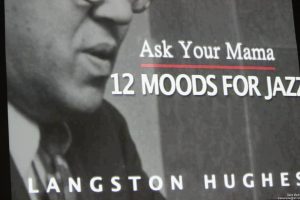 While Dr .Martin Luther King is an integral part of African American History Month aka Black History Month and in
While Dr .Martin Luther King is an integral part of African American History Month aka Black History Month and in 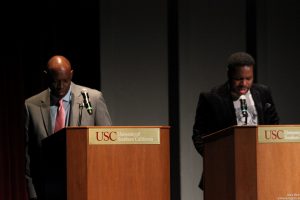 some parts of the world it is known as American History, Month, however, there is something to be said about the way a voice and music, can express what words can only suggest. Infusing the shrill sound of a trumpet, “Cultural Exchange” “Afronato” by Ron McCurdy and Eli Bruggemann part of Hughes’ first mood poured from the soul of USC’s, Dr. Ron McCurdy as he walked from the back of Bovard Auditorium and slowly made his way round a seated audience, to the stage. The professor and obviously, more than that, made the Thornton School of Music even more attractive to students in hopes of being the next Miles or for that matter, the next Ron McCurdy. While making his way up to the main stage, the musician, professor passed the spotlight onto his four young male Quintet proteges who would have had Charlie Parker shouting “why dem boys sound so good and Byrd saying, “Ask Your Mama.” Elegantly channeled and on the birthday of Langston Hughes, we were personally invited to, an evening of, “The Langston Hughes Project”, “Ask Your Mama”, 12 Moods for Jazz.
some parts of the world it is known as American History, Month, however, there is something to be said about the way a voice and music, can express what words can only suggest. Infusing the shrill sound of a trumpet, “Cultural Exchange” “Afronato” by Ron McCurdy and Eli Bruggemann part of Hughes’ first mood poured from the soul of USC’s, Dr. Ron McCurdy as he walked from the back of Bovard Auditorium and slowly made his way round a seated audience, to the stage. The professor and obviously, more than that, made the Thornton School of Music even more attractive to students in hopes of being the next Miles or for that matter, the next Ron McCurdy. While making his way up to the main stage, the musician, professor passed the spotlight onto his four young male Quintet proteges who would have had Charlie Parker shouting “why dem boys sound so good and Byrd saying, “Ask Your Mama.” Elegantly channeled and on the birthday of Langston Hughes, we were personally invited to, an evening of, “The Langston Hughes Project”, “Ask Your Mama”, 12 Moods for Jazz.
The Quintet was heavy “man” the sax and woodwind player, Tim McKay has been blowing the horn since age ten, Jacob Mann, a composer, ala pianist, arranger and educator rolled the keys back to Lansgton’s time and when the keys wiggled with a bit of finger movement at the end, it nearly set your soul on fire. Nate Light, an acclaimed Los Angeles bassist, had all ears in the house tuned to the highest HZ and all eyes on those long, big hands. What can you not say about Ivan Edwards, South Carolina, drummer, and percussionist held the rhythm section down for the entire set. With a BA in classical percussion performance from 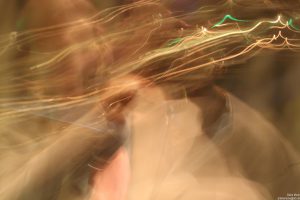 Charleston Southern University and a certificate in jazz from USC, the five, plus Malcolm makes six, filled Bovard
Charleston Southern University and a certificate in jazz from USC, the five, plus Malcolm makes six, filled Bovard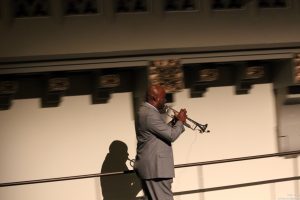 Auditorium up with a feeling of an-ti-ci-pa-tion. Well into 30 minutes after the start of the prose, spoken word and history bed of sound and streamed screen, folk were still coming in. USC student acting as hosts, quickly helped jazz and spoken-word lovers find their seats. The staff also provided additional seating for the disabled. As if the evening could not have been more delightful, from behind red curtains, up front center and dead on the mic, Langston, W. E. Dubois and Touissant Le Overture made their presence felt when acclaimed actor, director, and longtime “Cosby Show’s” Theo, Malcolm Jamal Warner, spoke. The resonance and tone of the voice of the poet, and bass player alone, were both compelling, and commanding, silencing any noise that might have been a distraction. The added volume and depth of the sound of Ron McCurdy, became an intimate, at one with the audience experience. At certain moments, it was blissful. A streamed array of faded black and whites aged with American History images tore into the hearts of all who looked at the richly textured backdrop. A haunting and sweet reminder of pain, pleasure, insanity, and education, flooded interested minds, as Malcolm lifted us up, expressing what appeared to be a part of himself. He was in the zone. The zone is the point of take-over when some forget themselves and become a piece of work the mouth of the artist. Hughes is Ron McCurdy is Malcolm Jamal Warner is you, snapping your fingers, patting your feet and the moods began to overtake, us.
Auditorium up with a feeling of an-ti-ci-pa-tion. Well into 30 minutes after the start of the prose, spoken word and history bed of sound and streamed screen, folk were still coming in. USC student acting as hosts, quickly helped jazz and spoken-word lovers find their seats. The staff also provided additional seating for the disabled. As if the evening could not have been more delightful, from behind red curtains, up front center and dead on the mic, Langston, W. E. Dubois and Touissant Le Overture made their presence felt when acclaimed actor, director, and longtime “Cosby Show’s” Theo, Malcolm Jamal Warner, spoke. The resonance and tone of the voice of the poet, and bass player alone, were both compelling, and commanding, silencing any noise that might have been a distraction. The added volume and depth of the sound of Ron McCurdy, became an intimate, at one with the audience experience. At certain moments, it was blissful. A streamed array of faded black and whites aged with American History images tore into the hearts of all who looked at the richly textured backdrop. A haunting and sweet reminder of pain, pleasure, insanity, and education, flooded interested minds, as Malcolm lifted us up, expressing what appeared to be a part of himself. He was in the zone. The zone is the point of take-over when some forget themselves and become a piece of work the mouth of the artist. Hughes is Ron McCurdy is Malcolm Jamal Warner is you, snapping your fingers, patting your feet and the moods began to overtake, us.
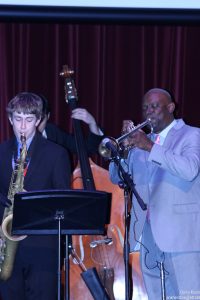 As if transported to a time of not so long ago, we must remind ourselves of the deep intimacy shared for 400 years between two cultures. Now, in today, we continue to share that history. A long-term marriage seeking answers as to how, when and where, did things go wrong? Mood 4 an Ode to Dinah, an accurate descriptive of a Mingus mood, you could hear the man’s horn whaling, just like back in the day. There stood Dinah, posed on a backdrop as if hand, picked by Anna Wintour, to do a “Vogue Special Edition.”
As if transported to a time of not so long ago, we must remind ourselves of the deep intimacy shared for 400 years between two cultures. Now, in today, we continue to share that history. A long-term marriage seeking answers as to how, when and where, did things go wrong? Mood 4 an Ode to Dinah, an accurate descriptive of a Mingus mood, you could hear the man’s horn whaling, just like back in the day. There stood Dinah, posed on a backdrop as if hand, picked by Anna Wintour, to do a “Vogue Special Edition.”
By the time Warner, the Quintet and McCurdy revealed Mood 6, “ Horn of Plenty”, Meet Me At Congo Square”, it was plenty of good music coming from the left side of the house. Their voices, Malcolm’s voice touched us. He touched us deep gave us honest suggestions and teased us with hints of righteousness. The crowd slapped, a knee, and whooped like, I hear ya talking my brother. Interpreted in a way that could never be mistaken for a copy, “Gospel Cha Cha Cha” Mood 7 and “Is It True”,Mood 8, drew even more grunts and moans from an audience already heavily ladled with some I feel good.
Langston Hughes, Mood 9, simply called, “Ask Your Mama”.Wait, don’t we ask our mama about all sorts of things? Mood 10, seduced all who relaxed, got into the music and who shared Langston’s lament. He was indeed, a black man, a beautiful black man, who told of years gone by, of colors that did not mix together well on reality’s palette, or did they?
“Hesitation Blues” by W. C. Handy and Mood 11, “Jazztet Muted”, were brilliantly delivered. By now, the mood of the crowd was hot and frenzied.
Bovard and the people who visited for one evening only, were not only captivated but satisfied.
There would be no need for blood, no need to get even, no need for , “Show Fare”, hell the show was live and in living color. Mood 12 an Eli Brueggemann piece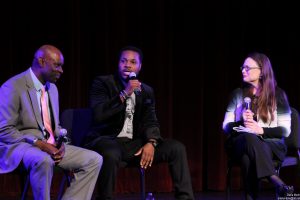 shut the doors down. The forever became the end. There was no need to get a refund or complain that the show did not meet our expectations. We were offered a twenty minute question and answer afterwards. Bothered by the fact that the moods read was over, knees steadied and chins lifted as the voice of Hughes lay silenced once more. Perhaps in the near future, he would be called upon again to speak, to make us cry, laugh and wish that we could have been there sucking our teeth, grinding our fist, paying train fair and frying fish on the steps of grandma’s back porch.
shut the doors down. The forever became the end. There was no need to get a refund or complain that the show did not meet our expectations. We were offered a twenty minute question and answer afterwards. Bothered by the fact that the moods read was over, knees steadied and chins lifted as the voice of Hughes lay silenced once more. Perhaps in the near future, he would be called upon again to speak, to make us cry, laugh and wish that we could have been there sucking our teeth, grinding our fist, paying train fair and frying fish on the steps of grandma’s back porch.
And for a moment we could see our memories of dark clouds after sun drenched skies, and we could hear us saying, Daddy can we watch some TV, and daddy, turned all the way round, and with a quick flash of white teeth, said, “Ask Your Mama”.
The Langston Hughes Project Ask Your Mama, 12 Moods for Jazz is presented by USC Visions and Voices The Arts and Humanities initiative. Organized by Rom McCurdy (Music) Gabrielle Pina (Master of Professional Writing) Brighde Mullins ( Master of Professional Writing) and Michele Turner (Black Alumni Association) Co-sponsored by the Master of Professional Writing Program and the Black Alumni Association.
